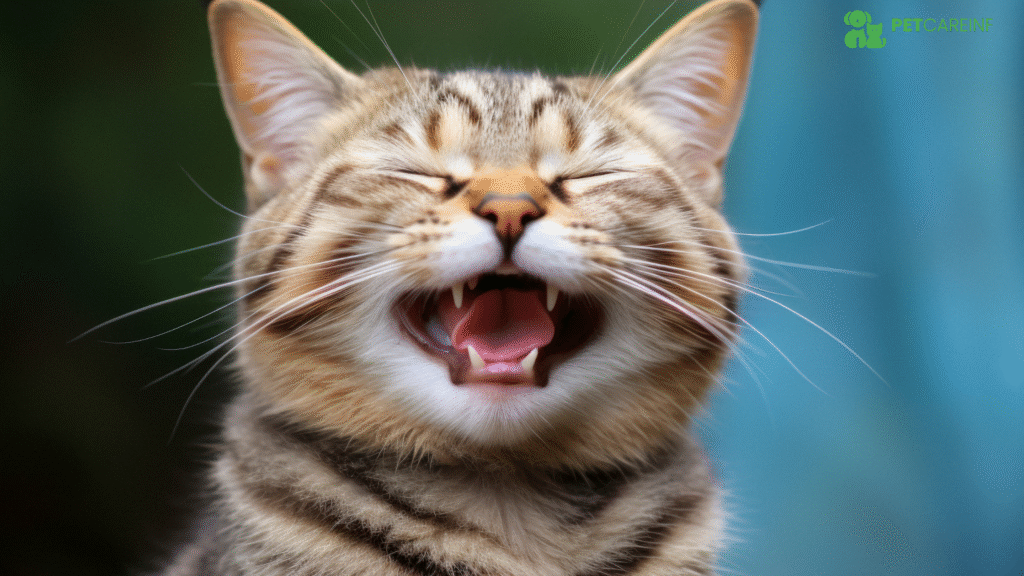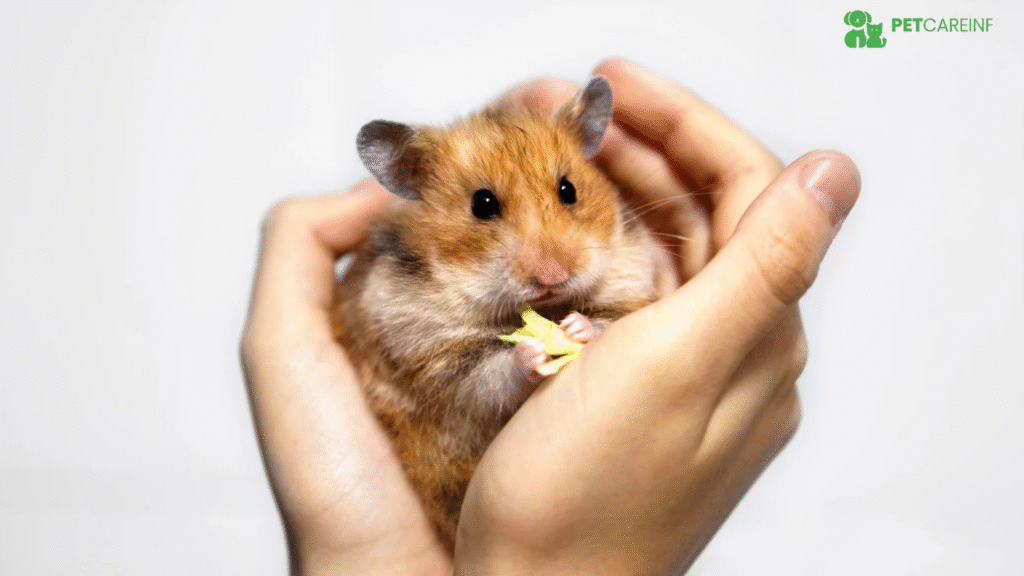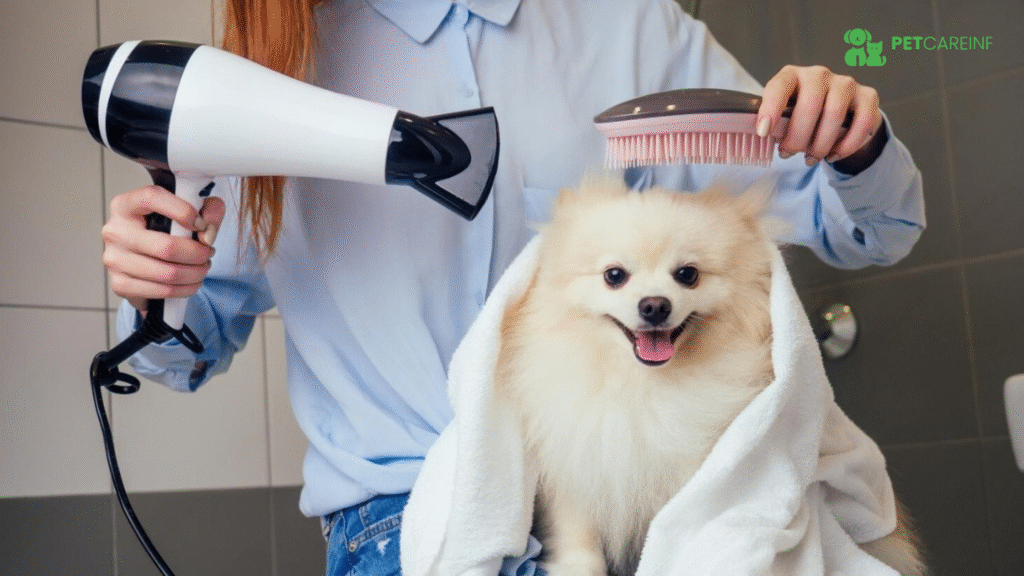Table of Contents
Have you ever looked at your cat and seen drool sliding down its chin? A little cat drool may seem strange, but not all drooling means something bad. Some cats drool when they’re happy, while excessive cat drool can point to health problems. Let’s go step by step to learn what’s normal, what’s not, and when you need to take action.
Understanding Cat Drool
Drooling in cats is when extra saliva comes out of the mouth. A cat with drool can look messy, and sometimes owners think it’s just a funny habit. In reality, drool cat have two main sides: harmless and medical.
Some cats drool when they’re relaxed, purring, or even sleeping. Others may drool because of pain, stress, or sickness. The key is knowing which type of cat drooling you’re seeing.
.
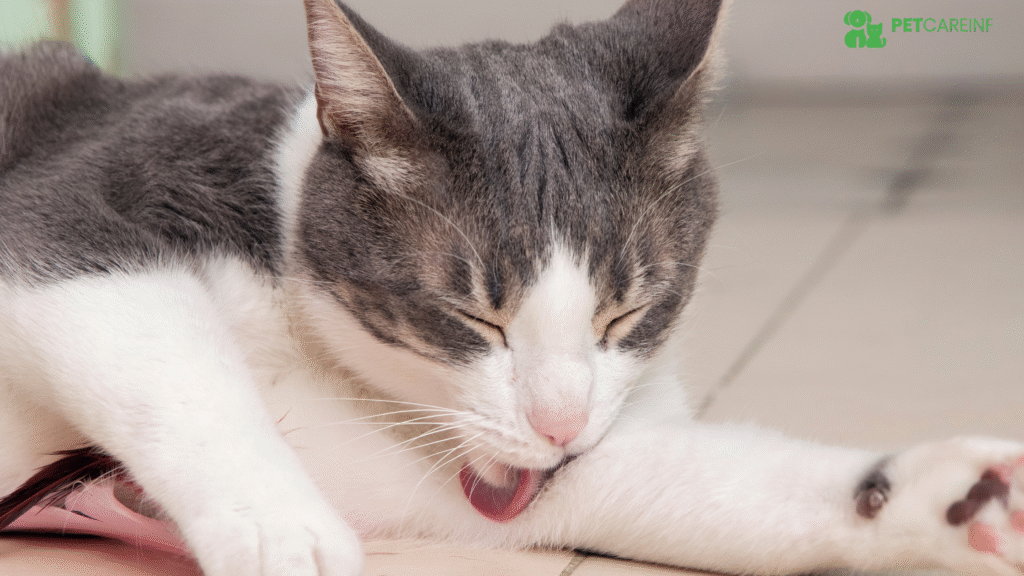

Normal Causes of Cat Drool
Not all drooling is a reason to worry. Some cats just drool in happy or calm moments.
- Relaxation: Cats often drool when they’re deeply relaxed, like when curled up on your lap. The body loosens up, and saliva slips out.
- Purring: Some cats release saliva when they purr hard. The brain links comfort with drool production.
- Petting and Kneading: If you stroke your cat and it kneads with its paws, drooling can happen as a natural sign of pleasure.
- Sleep: During deep sleep, muscles relax, and a little drool may appear on the pillow or blanket.
These causes are harmless. If your cat drools only in these times and looks healthy otherwise, you don’t need to panic.
Medical Causes of Cat Drool
Sometimes drooling signals a bigger problem. Cat excessive drool or sudden drooling can be linked to health issues.
- Dental Problems: Gum disease, broken teeth, or mouth infections can cause pain that makes a cat with drool drip saliva.
- Mouth Ulcers: Open sores inside the mouth create pain and trigger saliva flow.
- Infections: Respiratory infections or viruses can lead to drooling along with coughing or nasal discharge.
- Toxins and Poisoning: Household plants, chemicals, or spoiled food can cause drool and may be very dangerous.
- Heatstroke: Overheating can cause panting and drool in cats, especially in hot climates.
- Stress or Anxiety: Nervous cats sometimes drool under high stress, like during a car ride.
Red flag signs include blood in saliva, refusal to eat, pawing at the mouth, or constant drooling without rest. These need quick vet care.
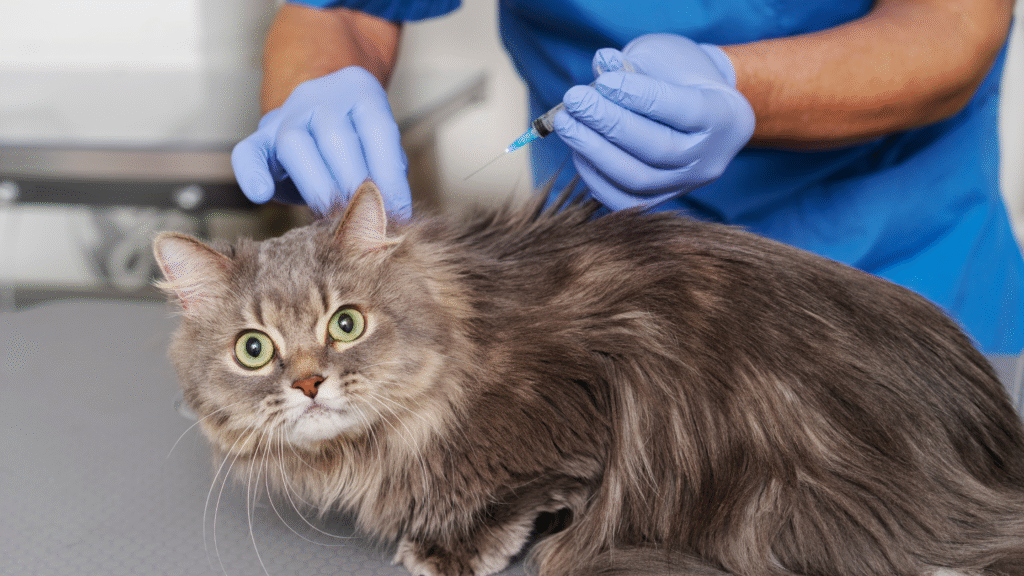

Why Does My Cat Drool Suddenly?
If you ask, why does my cat drool all of a sudden, it often means something has changed fast. A cat that never drooled before but suddenly does may be facing:
- Stress or fear from a loud sound, trip, or new environment.
- A foreign object stuck in the mouth, like string, a toy piece, or grass.
- Sudden pain from dental injury or ulcer.
- Poison exposure, such as licking toxic plants or chemicals.
- Heatstroke, especially if the cat has been in hot sun.
When drooling comes on quickly and your cat looks weak, confused, or keeps pawing at the face, this is not normal. Call a vet right away.
Drooling During Sleep or Purring
Some drooling happens during sleep or while your cat is purring. Let’s look at each case.
Cat Drooling While Sleeping
A drool cat during sleep may just have relaxed muscles, letting saliva escape. This is usually safe. But if you also notice heavy breathing, coughing, or restless sleep, it could mean illness. Keep an eye on patterns.
Cat Drooling When Purring or Being Petted
Drooling while purring or during petting is often called “happy drool.” Cats connect joy with drooling. But in rare cases, cats may purr when in pain, so if drooling comes with hiding, loss of appetite, or crying, check with a vet.
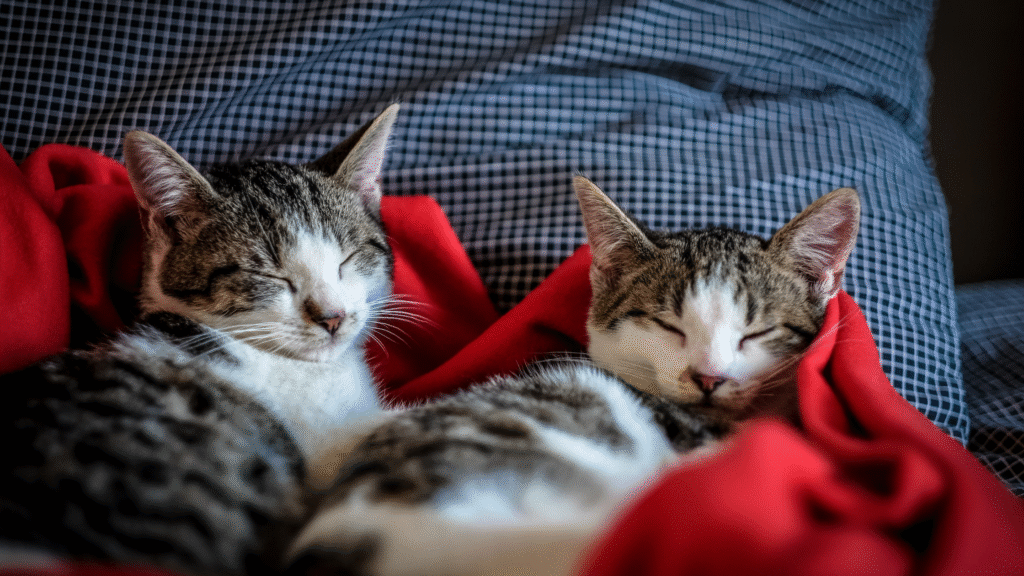

Cat Excessive Drool: When to Worry
Cat excessive drool means more saliva than normal. This is different from light drooling in sleep or purring. If your cat’s chin and chest stay wet often, it’s a warning.
Here’s a simple table to guide you:
| Mild Causes (Not Dangerous) | Serious Causes (Need Vet) |
| Happy purring | Dental disease |
| Sleep relaxation | Oral tumors |
| Petting response | Poisoning |
| Stress from travel | Heatstroke |
| Excitement from food smell | Organ disease |
If drool comes with weight loss, loss of appetite, vomiting, or foul mouth odor, it’s a sign of illness.
Special Concerns About Cat Drooling
Some drooling cases carry special meaning.
Cat Drooling Thick Saliva
When a cat with drool shows thick or sticky spit, it usually means something is not right. This kind of saliva can appear if the cat is dehydrated, has an infection inside the mouth, or something is blocking the throat. If the drool looks foamy or slimy, it may be the body reacting to poison or a toxic plant. Thick saliva is never normal and should not be ignored. If you see it more than once, take your cat to the vet without delay.
Cat Drooling Before Death
This is a very delicate subject. Cats that are very sick in their final days may show more drooling than usual. Excessive cat drool at this stage can be linked to kidney disease, cancer, or organs shutting down. The body cannot handle fluids the same way, and saliva builds up. If you see drool along with weakness, refusal to eat, or weight loss, it may mean your cat is near the end of life. Speak with a vet about gentle care or comfort treatment so your cat does not suffer.
Cat Drooling at Night
Some cats drool while sleeping. This may be caused by the way they lie down, by stress during the night, or by acid moving up from the stomach. A little drool every now and then is not usually a problem. But if you find your cat’s chin wet almost every morning, or you hear coughing or choking while it sleeps, it’s best to have the vet check for stomach or throat problems.
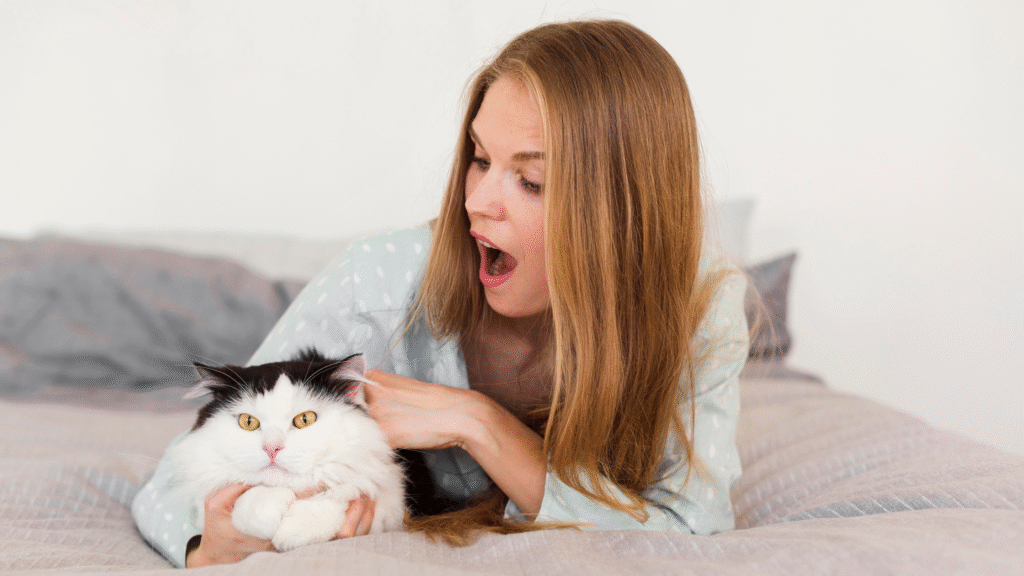

What You Can Do if Your Cat is Drooling Too Much
If your cat is drooling more than normal, here are a few simple checks you can do at home:
- Look inside the mouth: See if there are broken teeth, red gums, or something stuck.
- Smell the breath: Bad odor often points to gum or tooth disease.
- Watch eating: If food keeps falling out or your cat stops eating, pain in the mouth could be the cause.
- Notice other changes: Hiding, vomiting, or being weak are signs that something bigger is wrong.
- Avoid guessing: Do not give home remedies if you think your cat may have eaten poison.
- Call the vet: Sudden drool, blood in saliva, or thick foamy spit means your cat needs medical help.
Final Thoughts
Cat drool can be normal or a sign of something more serious. A little drool when your cat is purring, sleeping, or being petted is usually harmless. But excessive cat drool that appears suddenly, looks thick, or comes with sickness needs quick vet care.
The best way to protect your cat is to watch closely and act early. If you ever ask yourself, “why does my cat drool so much?”, remember: happy drool is fine, but constant or unusual drool is a red flag. Your vet can guide you to the right answer and keep your furry friend safe.
Frequently Asked Questions
Why would my cat drool all of a sudden?
A cat may drool suddenly from stress, pain, poison, or a stuck object. If sudden drool continues or comes with weakness, call a vet.
Why would my cat drool while sleeping?
Cats sometimes drool in deep sleep as muscles relax. If drooling is constant or comes with coughing or trouble breathing, it may be a medical issue.
Cat drooling before death — what does it mean?
Cats near death may drool due to organ failure or severe illness. If you see this with weight loss and weakness, seek palliative vet care.
Cat drooling excessively but acting normal — should I worry?
Some cats drool when purring or happy. If the drool is mild and your cat eats, plays, and looks normal, it’s likely safe. Monitor closely for changes.
Why is my cat drooling thick saliva?
Thick or sticky saliva often comes from dehydration, dental disease, or poison. If the saliva looks like foam or slime, get vet help quickly.
Why is my cat drooling when I pet her?
Cats may drool when petted as a sign of joy. Saliva release is linked to relaxation. If drooling is heavy or comes with pain, get a checkup.
Why is my cat drooling when purring?
Drooling during purring is common. It shows relaxation. But sometimes cats purr when stressed or in pain, so watch for other warning signs.
Why would my cat drool at night?
Cats may drool at night due to deep sleep, reflux, or stress. If it happens often and your cat shows sickness, visit a vet.

